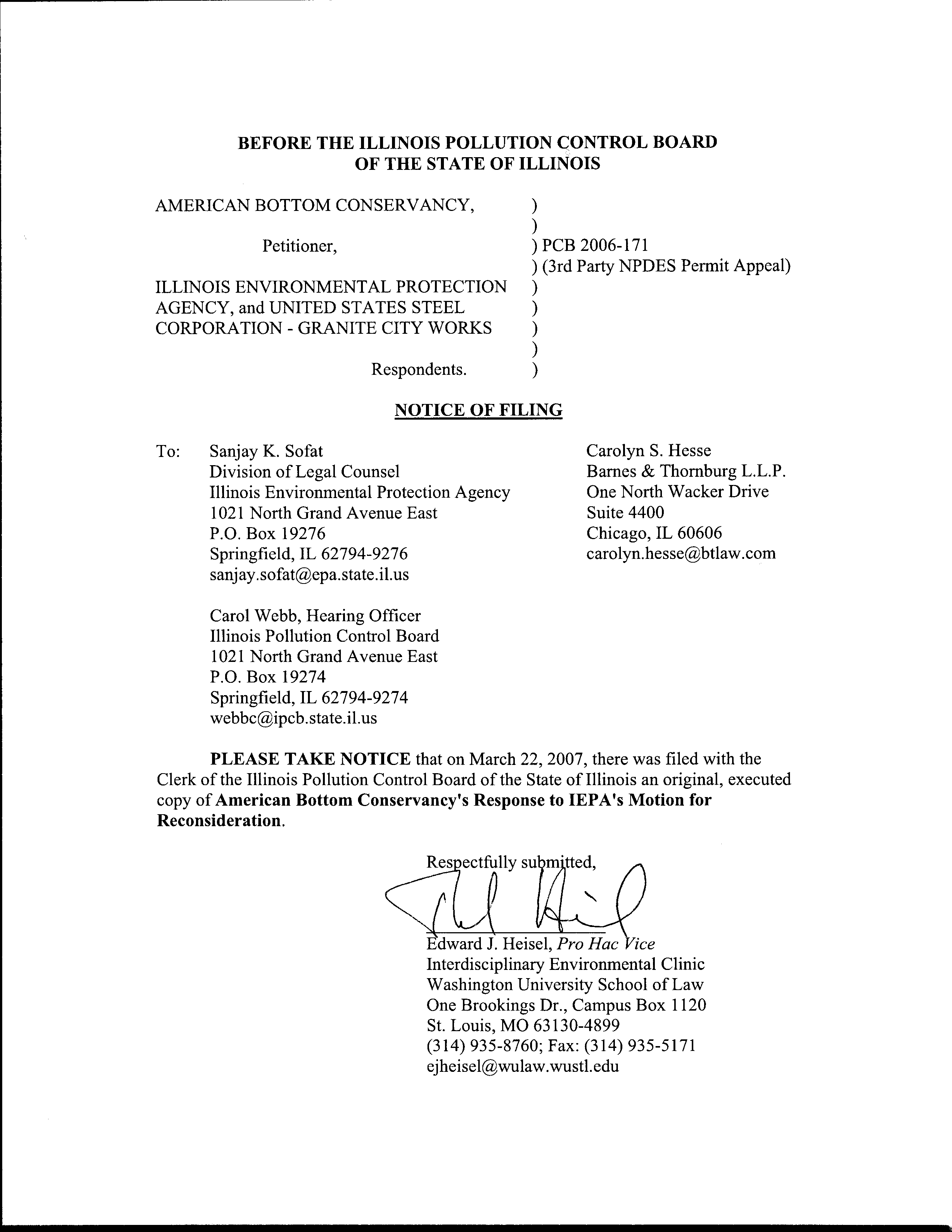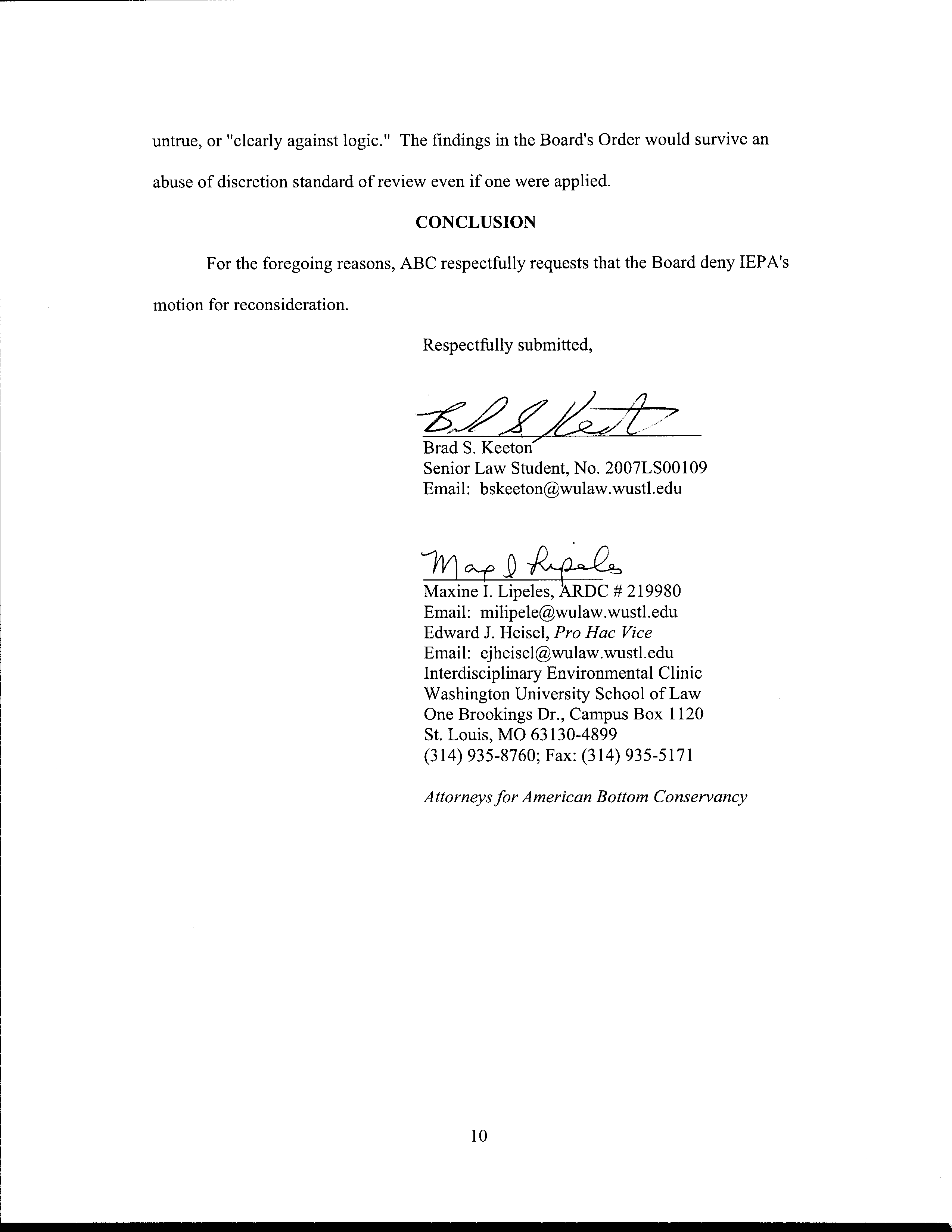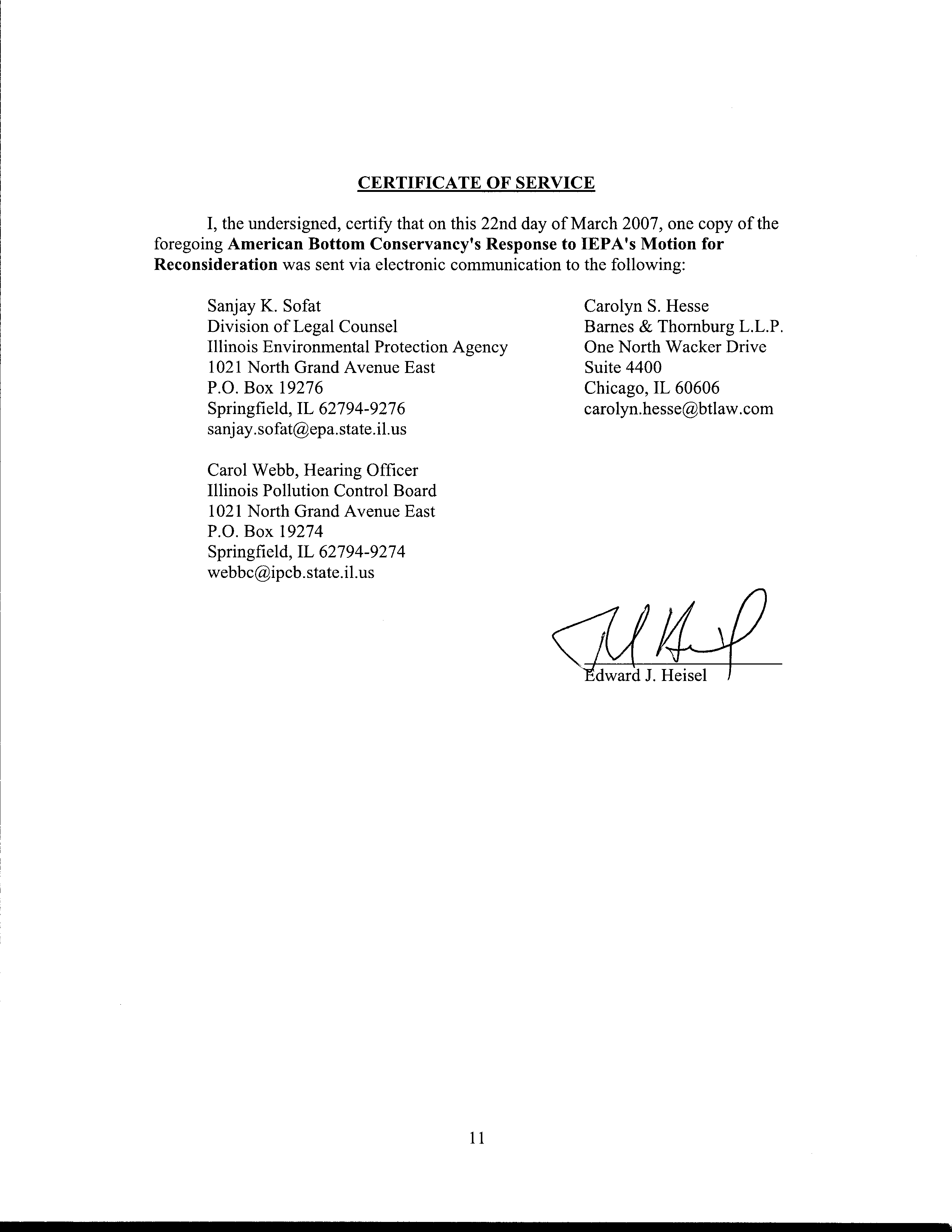Electronic Filing, Received, Clerk's Office, March 22, 2007
1
BEFORE THE ILLINOIS POLLUTION CONTROL BOARD
OF THE STATE OF ILLINOIS
AMERICAN BOTTOM CONSERVANCY,
)
)
Petitioner,
)
) Case No. PCB 2006-171
) (3rd Party NPDES Permit Appeal)
ILLINOIS ENVIRONMENTAL PROTECTION
)
AGENCY, and UNITED STATES STEEL
)
CORPORATION - GRANITE CITY WORKS
)
)
Respondents.
)
AMERICAN BOTTOM CONSERVANCY'S RESPONSE TO
IEPA'S MOTION FOR RECONSIDERATION
I.
INTRODUCTION
On January 26, 2007, the Board concluded that IEPA's issuance of a NPDES
permit to U.S. Steel without first holding a public hearing violated the Board's regulations
and it therefore invalidated the permit. IEPA now seeks reconsideration of the Board's
Order, asserting that the Board should have applied a deferential "abuse of discretion"
standard of review when it reviewed IEPA's decision to forego a public hearing for the
U.S. Steel permit. However, neither the Act nor applicable judicial authority require the
Board to accord such deference to IEPA's decisions, and the agency's motion should be
denied.
The Board's regulations state that IEPA "shall" hold a public hearing whenever
there exists a "significant degree of public interest in the proposed permit" and create a
presumption in favor of such hearings by also requiring IEPA to hold hearings in
"instances of doubt." Through its motion – and as indicated by the record in this appeal –
IEPA seeks to convert the word "shall" in the regulation to "may," thereby reserving to
Electronic Filing, Received, Clerk's Office, March 22, 2007
2
itself the final word on when public hearings will be held. The Board regulation does not
support this liberal interpretation and instead sets forth a standard against which the
agency's decision can be reviewed on appeal. IEPA has provided no credible rationale
for why its decision on public hearing requests should be given different treatment on
appeal than other decisions made during the permitting process.
If ever there were a situation deserving of a public hearing, the permit for U.S.
Steel's Granite City Works is it. The permit authorizes a major industrial discharge into a
lake located within a state park that is visited by hundreds of thousands of people each
year. The permit literally authorizes U.S. Steel to discharge hundreds of tons of
pollutants each year into Horseshoe Lake, a lake that is already considered "impaired."
Despite these facts and requests from several organizations for a public hearing, IEPA
apparently found (although it never provided an explanation to Petitioner) that there was
not a "significant degree of public interest" in the permit. IEPA thus issued the permit
without first offering a public hearing or otherwise addressing the concerns raised in
comment letters.
II.
FACTUAL BACKGROUND
On December 19, 2004, IEPA put on public notice a proposed NPDES permit for
U.S. Steel's Granite City Works. (AR 518-28).
1
According to the notice, U.S. Steel's
plant is a major point source discharger that dumps twenty-five million gallons per day of
wastewater into Horseshoe Lake (AR 518), a lake which has no outflow during dry
periods. (AR 312). The draft permit attached to the public notice (AR 524-28) and the
1
The designation "AR" refers to the administrative record for this appeal.
Electronic Filing, Received, Clerk's Office, March 22, 2007
3
final permit that was issued some fourteen months later (AR 651-57) both allowed for
hundreds of tons of pollutants to be discharged into the Lake each year.
2
During the thirty-day comment period that ran from December 19, 2004, through
January 18, 2005, five organizations submitted written comments. One of the letters was
submitted by the organization Health & Environmental Justice-St. Louis (AR 532) and
the other was jointly submitted by five organizations, including the American Bottom
Conservancy, Sierra Club, Webster Groves Nature Study Society, Health &
Environmental Justice-St. Louis, and the Neighborhood Law Office. (AR 537-39). Both
comment letters requested a public hearing, asked for an extension of the comment
period, and raised numerous concerns about the draft permit. Specifically, the letters
cited "discharges of toxic heavy metals known to accumulate in biological organisms,"
the fact that Horseshoe Lake is already considered "impaired" by several pollutants, that
academic studies had shown high levels of metals in the Lake's sediment, and that the
U.S. Steel facility has a history of non-compliance. The letters also pointed out that the
Lake is used heavily for recreation, including for birdwatching, hunting, and fishing, and
that many people consume fish from the Lake, some for subsistence purposes.
IEPA initially issued the permit to U.S. Steel on March 8, 2006, more than a year
after the public comment period had closed. (AR 635-43). Despite this lengthy period of
time, IEPA failed to respond to the comments prior to issuing the permit – an oversight
that the Agency acknowledged was inconsistent with applicable regulations after ABC
inquired – and it subsequently reissued the permit on March 31, 2006. (AR 648, 651-57).
IEPA did not amend the draft permit in any respect in response to the public comment
2
There were only two changes made to the final permit, both of which were in response to
comments submitted by U.S. Steel. (AR 635).
Electronic Filing, Received, Clerk's Office, March 22, 2007
4
letters, nor did it ever provide an explanation to the commentors as to why it decided not
to hold a public hearing. (AR 649-50).
On May 8, 2006, ABC filed its Petition for Review, which sought the Board's
review of various effluent limits in the permit and of IEPA's decision to forego a public
hearing. By Order dated September 21, 2006, the Board dismissed ABC's claims
challenging the effluent limits because the claims were not based on comments submitted
during the initial thirty-day comment period. The Board's Order, however, stated that
ABC's Petition had "asserted facts that if proven true would show a significant degree of
public interest in the proposed permit to warrant the holding of a hearing." A Board
hearing was thus held on November 20, 2006, at which testimony was heard on the issue
of whether IEPA's decision not to hold a public hearing complied with the Board's
regulations.
On January 26, 2007, the Board issued its Order, finding that "there is a
significant degree of public interest in this case," that IEPA's decision not to hold a public
hearing was "clearly incorrect," and that IEPA's decision "violates Section 309.115(a) of
the Board's regulations." Board Order, p.14. As a result, the Board invalidated the U.S.
Steel permit.
III.
APPLICABLE REGULATIONS
The Board's regulations set forth the standard governing IEPA's determination on
whether to hold a public hearing on an NPDES permit:
The Agency shall hold a public hearing on the issuance or denial of an NPDES
Permit or group of permits whenever the Agency determines that there exists a
significant degree of public interest in the proposed permit or group of permits
(instances of doubt shall be resolved in favor of holding the hearing), to warrant
the holding of such a hearing.
Electronic Filing, Received, Clerk's Office, March 22, 2007
5
35 Ill. Admin. Code § 309.115(a)(1) (2005).
The presumption in the Board's regulation favoring public hearings tracks the
requirements of the federal Clean Water Act. The U.S. Supreme Court has noted that,
although a public hearing is not required when a party does not request one, public
participation is an "essential element" of the NPDES program and Congress intended for
the public to have a "genuine opportunity to speak on the issue of protection of its
waters."
Costle v. Pacific Legal Foundation,
445 U.S. 198, 216 (1980) (
quoting
S. Rep.
No. 92-414, at 72 (1971)). Moreover, at least one other state's environmental review
board, in overturning an agency's denial of a public hearing request, has noted the
importance of being responsive to the public interest.
See Queen v. Div. of
Environmental Protection
, Appeal No. 621, 1996 WL 738740 (W. Va. Envtl. Quality Bd.
Aug. 13, 1996) (holding that the state agency improperly denied a request for a public
hearing on an NPDES permit).
IV.
ARGUMENT
IEPA seeks reconsideration of the Board's Order, arguing that its decision not to
hold a public hearing should be treated differently than other decisions and accorded
substantial deference by the Board. IEPA's assertions find no support in the Act, the
Board's regulations, or applicable judicial authority. There is no authority that requires
the Board to treat decisions not to hold a public hearing differently than other decisions
made by IEPA as part of the permitting process. What IEPA is really seeking is to shield
one category of its decisions from the Board's scrutiny, thereby usurping the Board's
quasi-judicial powers and hindering citizens' ability to participate in the NPDES
permitting process.
Electronic Filing, Received, Clerk's Office, March 22, 2007
6
IEPA also goes overboard in characterizing the effect of the Board's Order,
suggesting that "the Board is also requiring the Agency to grant public hearing [
sic
]
whenever one is requested by the public." Motion, p.12. To the contrary, the Board's
Order was simply an exercise of its quasi-judicial authority that resulted in a finding that
IEPA had incorrectly determined that there was not a "significant degree of public
interest" in the U.S. Steel permit. The Order does not require that IEPA hold a hearing
whenever one is requested.
A public hearing was required for the U.S. Steel permit because there was clearly
a significant degree of public interest. Comment letters from organizations representing
thousands of members cited heavy public use of Horseshoe Lake and raised serious
concerns about the draft permit. The Lake is visited by hundreds of thousands of people
each year, is already listed as impaired due to excess pollution, and U.S. Steel would be
allowed to dump literally hundreds of tons of pollutants into the water each year under
the permit as issued, including some of the pollutants for which the Lake is already
impaired.
A.
The Board is Not Required to Apply an "Abuse of Discretion"
Standard of Review When Reviewing IEPA's Decision Not to Hold a
Public Hearing.
IEPA argues that the Board is required to give considerable deference to IEPA's
decision not to hold a public hearing. It suggests that the Board is obliged to apply the
deferential "abuse of discretion" standard of review. This narrowing of the Board's quasi-
judicial role – and concomitant expansion of IEPA's power over permitting decisions – is
not warranted by the Act, the Board's regulations, nor governing judicial authority.
Electronic Filing, Received, Clerk's Office, March 22, 2007
7
The Illinois Supreme Court rejected a nearly identical argument twenty-one years
ago in
IEPA v. IPCB,
503 N.E.2d 343 (Ill. 1986). The Supreme Court held that when the
Board acts in its quasi-judicial role in relation to permits issued by IEPA it is not
constrained by a narrow standard of review.
Id.
at 345. Only in situations where the
underlying decision was made as part of a more rigorous adversarial proceeding might
the Board owe deference to the decisionmaker.
Id.
3
Like the situation in
IEPA v. IPCB
,
IEPA's decision to deny the requests for a public hearing for the U.S. Steel permit was
made without an adversarial proceeding below. In fact, IEPA never even provided ABC
or other commenters with an explanation of why it decided not to hold a hearing. The
unexplained decision by IEPA to not hold a public hearing on the U.S. Steel permit
should not be accorded a deferential standard of review.
IEPA relies extensively upon the Third District's decision in
Borg-Warner v.
Mauzy,
427 N.E.2d 415 (3
rd
Dist. 1981), to argue that the Board must apply an abuse of
discretion standard of review. That case is distinguishable in that the plaintiff company
filed suit directly in the circuit court, arguing that it was entitled under the Illinois
Administrative Procedure Act to an "adjudicatory hearing" before IEPA made a decision
on its permit application.
Id.
at 417. The Third District's commentary about the Board's
public hearing regulation was thus made in the context of
judicial
review and the court
did not hold that the
Board
must defer to IEPA's decision on whether or not a public
hearing is required.
Id.
at 417. In fact, the court noted that the Board applies
de novo
review in permit appeals.
Id.
at 420. As acknowledged by the Supreme Court in
IEPA v.
3
At the time
IEPA v. IPCB
was decided, only permit applicants were authorized by the Act to appeal
IEPA's permitting decisions. The Supreme Court's reasoning applies equally to the subsequently
authorized third-party appeals of NPDES permits.
Electronic Filing, Received, Clerk's Office, March 22, 2007
8
IPCB
, courts and the Board apply different standards of review.
IEPA v. IPCB,
503
N.E.2d at 345-46.
It would be illogical, as IEPA urges the Board to do, to treat decisions made under
the public hearing regulation differently from decisions made under other sections of the
Act or regulations. For example, Section 39(b) of the Act states that IEPA "may issue
NPDES permits." 415 ILCS 5/39(b). The fact that the Act assigns this duty initially to
IEPA, and that it uses the word "may," does not render such decisions immune from
Board review, nor insulate IEPA's decision with a deferential standard of review.
See
IEPA v. IPCB,
503 N.E.2d at 345. Similarly, the Board's regulations contain an anti-
degradation policy that requires site-specific application of relatively broad regulatory
terms.
See
35 Ill. Admin. Code § 302.105(c). Application of these terms to specific
permits is not noticeably different from determining whether the standard of "significant
degree of public interest" has been met. In sum, there is no legal or logical rationale for
treating IEPA's decision on public hearing requests differently from other decisions made
as part of the permitting process.
See also Prairie Rivers Network v. IPCB,
781 N.E.2d
372, 379-80 (4
th
Dist. 2002) (finding that identical burden of proof applied to substantive
and procedural challenges to NPDES permit).
Finally, the need for Board review is heightened in this appeal for two reasons.
First, IEPA never provided an explanation to those who requested a public hearing as to
why one would not be held. (AR 649-50). This complete failure to even acknowledge
the requests for public hearing cries out for independent review by the Board. Second,
IEPA badly misconstrued the standard for a public hearing when drafting the public
notice for the permit. The notice states: "If written comments or requests indicate a
Electronic Filing, Received, Clerk's Office, March 22, 2007
9
significant degree of public interest in the draft permit, the permitting authority may, at
its discretion, hold a public hearing." (AR 518, 522). The regulation actually states that
IEPA "shall" hold a public hearing if it finds a significant degree of public interest, not
that it "may." These two facts indicate that IEPA gave little thought to its obligation
under Board regulations to involve the public in the permitting process.
The Board's regulation governing public hearings cannot be brushed aside by
IEPA as it would apparently like to do. The Board has broad authority under the Act to
adopt regulations to "implement" the environmental standards of Illinois. 415 ILCS §
5/5(b). It is also within the Board's authority to ensure that these regulations are
complied with through its quasi-judicial powers.
Id.
§ 5/40. There is nothing in these
provisions that require the Board to defer to IEPA's determination not to hold a public
hearing. The Board's expertise in the environmental field and its responsibilities under
the Act support use of the
de novo
standard of review applied in this appeal.
B.
The Board's Findings Would Satisfy the Abuse of Discretion Standard
of Review.
Even if the Board applied an abuse of discretion standard of review, ABC would
still prevail. The Board found in its Order that "the decision that there was not a
significant degree of public interest was
clearly incorrect
." Board Order, p.14 (emphasis
added). "Clearly incorrect" is nearly synonymous with "clearly against logic," one of the
interpretations given to the abuse of discretion standard by Illinois courts.
Deen v.
Lustig
, 785 N.E.2d 521, 529 (4
th
Dist. 2003). Webster's Dictionary defines "incorrect" as
"not true" and "logical" as "formally true or valid."
Merriam Webster's Collegiate
Dictionary
, 589, 685 (10
th
ed. 1993). Thus, to say something is "clearly incorrect," as the
Board said about IEPA's decision to forego a public hearing, is to find that it is clearly
Electronic Filing, Received, Clerk's Office, March 22, 2007
Electronic Filing, Received, Clerk's Office, March 22, 2007
Electronic Filing, Received, Clerk's Office, March 22, 2007



